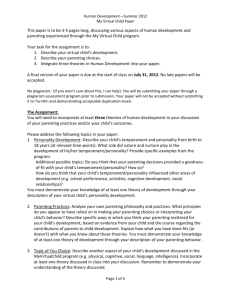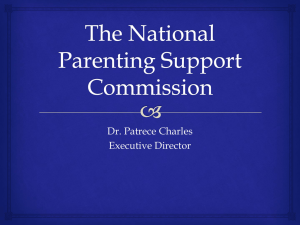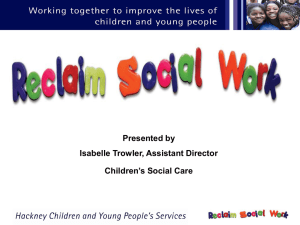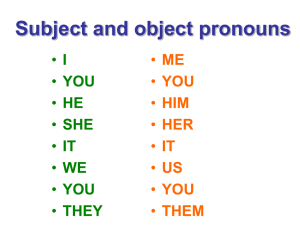My Virtual Child
advertisement
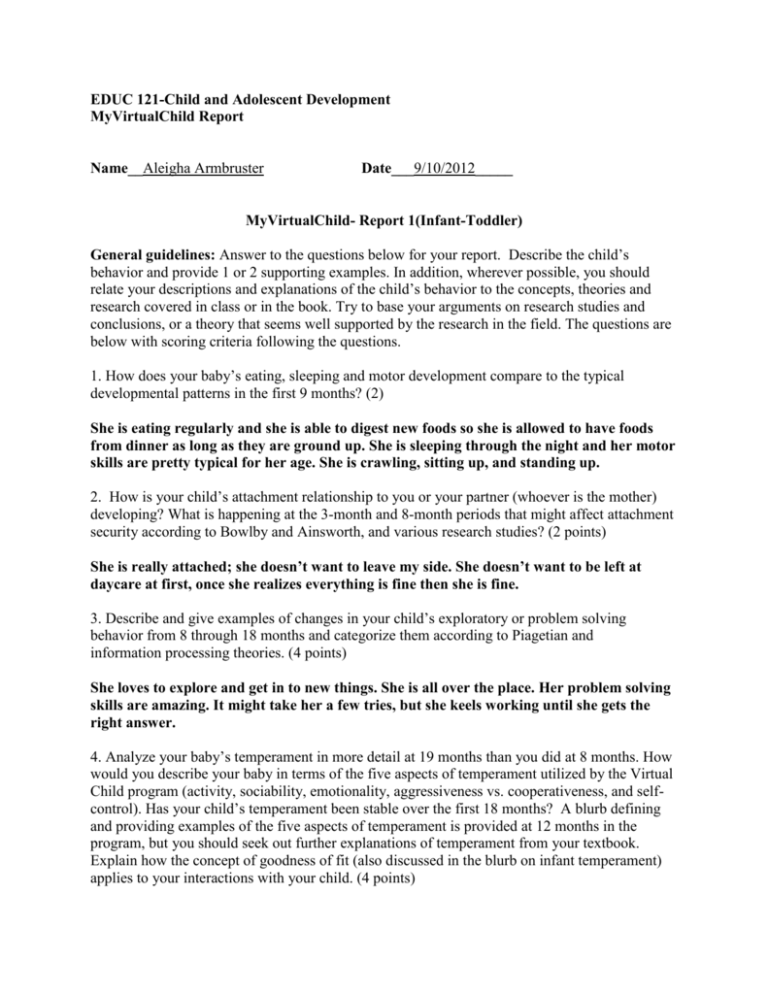
EDUC 121-Child and Adolescent Development MyVirtualChild Report Name__Aleigha Armbruster Date___9/10/2012_____ MyVirtualChild- Report 1(Infant-Toddler) General guidelines: Answer to the questions below for your report. Describe the child’s behavior and provide 1 or 2 supporting examples. In addition, wherever possible, you should relate your descriptions and explanations of the child’s behavior to the concepts, theories and research covered in class or in the book. Try to base your arguments on research studies and conclusions, or a theory that seems well supported by the research in the field. The questions are below with scoring criteria following the questions. 1. How does your baby’s eating, sleeping and motor development compare to the typical developmental patterns in the first 9 months? (2) She is eating regularly and she is able to digest new foods so she is allowed to have foods from dinner as long as they are ground up. She is sleeping through the night and her motor skills are pretty typical for her age. She is crawling, sitting up, and standing up. 2. How is your child’s attachment relationship to you or your partner (whoever is the mother) developing? What is happening at the 3-month and 8-month periods that might affect attachment security according to Bowlby and Ainsworth, and various research studies? (2 points) She is really attached; she doesn’t want to leave my side. She doesn’t want to be left at daycare at first, once she realizes everything is fine then she is fine. 3. Describe and give examples of changes in your child’s exploratory or problem solving behavior from 8 through 18 months and categorize them according to Piagetian and information processing theories. (4 points) She loves to explore and get in to new things. She is all over the place. Her problem solving skills are amazing. It might take her a few tries, but she keels working until she gets the right answer. 4. Analyze your baby’s temperament in more detail at 19 months than you did at 8 months. How would you describe your baby in terms of the five aspects of temperament utilized by the Virtual Child program (activity, sociability, emotionality, aggressiveness vs. cooperativeness, and selfcontrol). Has your child’s temperament been stable over the first 18 months? A blurb defining and providing examples of the five aspects of temperament is provided at 12 months in the program, but you should seek out further explanations of temperament from your textbook. Explain how the concept of goodness of fit (also discussed in the blurb on infant temperament) applies to your interactions with your child. (4 points) Activity- She is very active, she loves to run around and play, go for walks, learn new things, and she loves to read. Sociability- She is very friendly unless there is something that she really wants, and then she will try to take it from the other children. She also has a shy side, where she will be uncomfortable around new people for a few minutes, and then she warms up and is fine. Emotionality- She is usually happy. She has a tantrum every once in a while but nothing that isn’t expected from a toddler. Aggressiveness vs. Cooperativeness- She is not very aggressive at all. The only time she gets that way is when there is something that she really wants and another child has it. As soon as she is corrected, then she finds something new to play with. Self-Control- She is really good with self-control, if she is told to wait for something she waits. I think her temperament has been extremely stable over her first 18 months of life. With the goodness of fit, if I realize that Kamryn is interested in something I will try to find out things that we can do for her to really see what it is all about. If she likes books on dogs and seems very interested in them, chances are I will get her a dog or at least take her around them. 5. Is your child delayed or advanced in any area of development according to the 19-month developmental examiner’s report? Based on what you have studied, do you think this is most likely a result of specific biological or environmental factors? (2 points) She is advanced in language comprehension and production and can talk in complete sentences about a picture. She is also above average in solving problems with more than two steps, and also in copying shapes. I feel like because of all the work and things that I have done with her she is better at things than a child that doesn’t have someone working with them. 6. Describe your child’s communication and language development in the first 30 months. Is your child developing at a typical or atypical rate? (2 points) She is above average in her communication and language development. She talks in full sentences when talking about a picture. 7. How is your child progressing on typical toddler issues, such as learning household rules, learning to follow routines, listening to you, developing self-control and learning to get along with other children? (2 points) She is having some issues with these, but we are working on them by giving her choices of doing one thing or another, both of which are things she needs to learn. MyVirtualChild- Report 2-Early Childhood (Age 3-4) General guidelines: Answer to the questions below for your report. Describe the child’s behavior and provide 1 or 2 supporting examples. In addition, wherever possible, you should relate your descriptions and explanations of the child’s behavior to the concepts, theories and research covered in class or in the book. Try to base your arguments on research studies and conclusions, or a theory that seems well supported by the research in the field. The questions are below with scoring criteria following the questions. 1. What activities and experiences have you and your child engaged in that might be promoting healthy behavioral practices and an interest in physical activity? Refer to the book and lecture where needed. (2 points) We try to play catch, basketball, and a little soccer with her. We try to encourage her to ride her tricycle more often and for longer periods of time. We are trying to get her to play more sports more often so that she has a greater interest in physical activity. 2. Describe the development of your child’s language and cognitive skills and discuss how these might be affecting his or her interactions with you & your responses. Refer to the text or lecture for descriptions and explanations of each area of skill. (2 points) She is above average on her language and cognitive skills. She is speaking in full sentences now, so we have full conversations. 3. How well is your child adapting to social situations in the home and outside the home? Does your child have any behavior or emotional problems at this point? Why do you think these problems are occurring and what are you doing about them? Refer to the text or lecture as needed. (2 points) She was really excited to get a new baby sister but then she got jealous that her sister was getting more attention. She has been doing well in school and is getting along with the other kids great. When she gets upset, she usually just needs someone to tell her everything is fine then is okay. 4. How would you characterize your parenting style (e.g., authoritative, authoritarian, permissive, or variations or combinations of these styles)? Refer to the book or lecture descriptions to justify your classification. How have your specific parenting techniques changed since infancy? (2 points) Authoritative, we praise her when she does something that is expected from her, and she gets punishments when she does something wrong. We have stuck to this same parenting style since she was born. 5. Describe three specific examples of changes in your child’s behavior at age 4 that seem to stem from growth in cognitive and language ability since the period of infancy (e.g., improvements in symbolic thinking, reasoning, knowledge of the world, theory of mind). Refer to the book or lecture. (4 points) She is really good with problem solving. It may take her a few minutes, but she will figure out the problem. She also has a great knowledge of the world. She wasn’t to know everything about everything. Anything that interests her we try to give her as much information about it that we can. 6. How would you characterize your child’s personality? Would you say that your child is primarily over controlled, under controlled or resilient? Support your argument. Recall that the Virtual Child’s behavior at age 3 and 4 is designed to resemble one of three personality types. The personality types combine some of the temperamental traits with which you are already familiar. The over controlled category refers to a child who is cooperative and follows the rules, but is shy in social situations and anxious and clingy under pressure. The under controlled category refers to a child who is uncooperative or even aggressive, does not follow the rules, may or may not be shy in social situations, and has a tendency to become distracted and overly emotional, particularly when under stress. The resilient category refers to a child who is cooperative and follows the rules, is friendly, non-aggressive and outgoing, able to focus on tasks without being too distracted, has good regulation of his or her emotions, and is adaptable to new situations. Refer to the course reader and lecture. (2 points) She is resilient. She is extremely outgoing, she follows the rules, and she is really friendly. She makes friends very easily. She is also good at focusing on a task that she has been given. 7. Look for evidence of continuity as well as discontinuity in your child’s behavior from infancy through early childhood. Give an example of an aspect of ability or personality that has remained fairly stable. Give an example of an aspect of ability or personality that has been unstable. Why do you think change occurred in one area and not the other? Refer to the book or lecture with regard to reasons for continuity or discontinuity. (4 points) She has always been really good at using her words. She learned at a really young age to talk and she has just progressed. One thing that hasn’t stayed the same is the fact that when she was younger she was really shy and now she is really outgoing and not shy at all. I think she realized as she got older that she didn’t need to be shy and hide behind us because no one was going to hurt her. 8. Your Virtual child is growing up basically in an average American cultural setting. Based on what you have learned from the course, how specifically might your child’s behavior be different if she was raised in a different culture? Alternatively, if you are familiar with a different culture (e.g., you or your parents were raised in a country outside America with a very different culture), you can describe how your parenting, or your child’s behavior might be different within that cultural setting. As a third option, describe and give examples of how your parenting style, or any other aspect of your parenting, has been influenced by your cultural background or other experiences. Describe the rationale for your claim, and the source of your information (book or lecture, or your own experience growing up at least partially within a particular culture). (4 points) I talked with my friend’s mom who was raised in Ecuador. She explained how things are so much different down there. If we were to raise a child there now our child would never have the opportunities that they have here. She told me that it is very rare for the children to go to a normal school after the fifth grade and only the wealthy have a chance to ever go to college. She was fortunate to be in a family that owned a lot so a lot of her family has college educations. If she wouldn’t have come to the United States she would have had an arranged marriage and raised a family in the same home that she grew up in. I am so glad that I will never have to deal with those kinds of things. MyVirtualChild-Middle Childhood (Age 6-11)-Report 3 General guidelines: Answer to the questions below for your report. Describe the child’s behavior and provide 1 or 2 supporting examples. In addition, wherever possible, you should relate your descriptions and explanations of the child’s behavior to the concepts, theories and research covered in class or in the book. Try to base your arguments on research studies and conclusions, or a theory that seems well supported by the research in the field. The questions are below with scoring criteria following the questions. 1. Based on the evidence from age 6 and 8 years, how well is your child adapting to the school social environment and to the peer group? To what extent does this adaptation seem to depend on personality characteristics that are fairly stable in your child, and to what extent does your child seem to be developing novel behavior to cope with these new situations? Refer to the textbook for particular points about the responses of children in this age group to the peer group and the school environment. (2 points) Kamryn loves school; she is above average in all subjects except for music. She loves to be around people and is always hanging out with her friends. She has a great personality and is very popular with the other in her class and also in our neighborhood. She loves to constantly be involved in some kind of activity. 2. How smart is your child, and in what areas? Refer to the summary of multiple intelligences that appeared at age 6 and to sections of your textbook and the course reader article on multiple intelligences. Find specific evidence regarding your child's verbal, logical mathematical, spatial, musical and bodily-kinesthetic intelligence from your observations of your own child as well as the psychologist's report at age 8 years, 11 months and explain how it ties in to the your course reading material. (2 points) She is above average in Math; she is working in a high 6th grade math class. She is above average in English, Science, History, and Art. She is very much aware of spatial intelligence also her verbal intelligence. She was reading at a 3rd grade level when she was just in 1st grade. 3. Describe some examples of your child's behavior or thinking that you think are due to typical American gender role socialization and explain why you think so, referring to the text and lectures regarding gender roles and sex differences in behavior. Several examples can be found in the Virtual Child program at ages 6 and 8. How closely does your attitude toward gender roles correspond to typical American attitudes, and if there is a discrepancy, to what do you attribute this (e.g., cultural background, attitudes of your own parents, etc.)? (2 points) She likes playing sport with the neighborhood boys, but she also loves to have sleepovers with her closest girl friends. The older she is getting the more in to fashion she is. She also loves to help me cook and clean the house. I don’t try to pressure her to do more “girly” things only because for me you like what you like, and if my daughter wants to play football or dance in ballet that is up to her. 4. Describe changes in your child’s academic skills between ages 6 and 10 and assess how well these skills are developing. If your child has any problems that affect school work, such as dyslexia, ADHD, or low levels of verbal, mathematical/scientific or spatial ability. Describe these problems and explain what you and the teachers are doing about them. The 5th grade report card will be useful for this but you should also incorporate your own observations. If your child doesn’t have any academic difficulties, describe what you are doing any way to help your child do well in math/science and literacy (reading, writing and communicating). (4 points) She is well above what she was at when she was 6. She is doing excellent in school, her grades are amazing. She loves science and she is really good at math, even algebra just comes easily to her. We have got her multiple programs to play on the computer that challenge her in math so that it doesn’t become boring. We also try to take her to art shows and science museums. 5. How well is your child adapting to social situations in the home and outside the home? Does your child have any behavior or emotional problems that have become apparent between 6 and 10 years of age? (some possibilities include internalizing and externalizing problems, ADHD, and obesity). Why do you think these problems are occurring and what are you doing about them? (2 points) She is great in social situations; she loves meeting new people and making new friends. When she gets stressed she sometimes gets upset, but it usually only takes her a few minutes to get over what is bothering her. I think she just gets overwhelmed sometimes, and she just needs a few extra minutes to calm down and relax. 6. Has your parenting changed since the preschool period and if so, why do you think it has changed and what effect might this have on your child? Refer to your textbook or lecture notes for evidence on typical changes in parenting that occur in middle childhood. (2 points) No, I am still being strict and the kids know the rules. They also know the consequences of breaking my rules. I feel I have chosen a great way to parent because my kids are well behaved, smart, respectful, and they still love to be around me. I think it’s a good thing to have rules and to stick with them no matter what. 7. Has your child’s personality type changed since age 4? Are there any personality traits and abilities on which your child closely resembles you? Describe two of them. Do you think this comes about because of a “genetic” resemblance (i.e., your questionnaire responses) or some consistent practices you’ve followed in your parenting? For example, if you and your child are both highly open to experience, and you took every available opportunity to explore new things with your child, is it possible you’ve taught your child to be open to experience? (4 points) She is a lot more outgoing than she was when she was 4. She is very social and loves being around people. We are a lot alike when it comes to being outgoing. She reminds me of myself when I was young. I think it is genetic, but I also think she has seen me and picks up a lot on it. We both also love to try new things. We both love to do adventurous things. She is very “out doorsy.” MyVirtualChild Report 4 –Adolescence (12-18 years) 1. Describe any physical or behavioral signs of incipient puberty, including changes in physical appearance, behavior or emotions at ages 12 and 14 years. (2 points) Kamryn has started gaining a little weight in her hip area. She is really uncomfortable with this change, but I explained that this happens to everyone when they hit puberty. I also tell her she will start having more changes that she will have to get used to. 2. What activities and experiences at ages 12 and 14 has your teen been involved in that might promote healthy behavioral practices, physical fitness and skill in sports? (2 points) She is playing tennis, and she is on the dance team. She is very active and always has to be doing something. She also watches what she eats because she wants to stay healthy. 3. Describe one change in your child’s thinking (e.g., changes in humor, abstract thinking, or theory of mind) and discuss how this might be affecting his or her interactions with you and your responses and his or her interactions with peers. Cite evidence from the course that these kinds of changes occur in early adolescence. (4 points) She thinks a lot about what is right and what is wrong in society. She is always talking about things being “fair” or “unfair”. We have talked to her about different situations and explained that things don’t always seem fair, but they might really be the right thing. 4. How important have your teen’s relationships with peers been to his/her social development, emotional well-being and school achievement from 14-18 years of age? (2 points) Her friends are everything to her. She is constantly hanging out with them. If she isn’t at their house, they are at ours. I think this is a good thing for her though because she has a good group of friends that are on the same path as her. They all have similar goals and a lot of their parents have the same way of parenting as me. 5. How has your teen adjusted at 14-18 years of age to typical adolescent issues such as risktaking, drugs, alcohol, and sexual interests, and how have you responded to your teen? (2 points) She was involved in underage drinking one time. I understand teenagers are going to experiment and are curious about these things. I was very angry and disappointed that she would act so irresponsible. She did call me to pick her up instead of driving or getting in a car with someone else that was drunk. She was grounded and had her car taken away. We also had a long discussion about underage drinking and she knows not to do it again. 6. Use the 7th & 9th grade report cards and your own observations to summarize your child’s academic skills at this point. What specific activities might promote some of these skills? What careers or courses of study might be best suited to your teen’s abilities and interests? (2 points) She is doing excellent. She has got all A’s on her report cards. She is also in all honors AP classes to prepare her for college. Her teachers commented telling me that she is a joy to have in class, and that she is a very hard worker. 7. As the program ends, what pathways does your child appear to be on in terms of physical, cognitive, social, emotional and moral development? Choose three aspects of your child to discuss. To what extent could you have predicted these pathways based on what you knew of your child's earlier development? (4 points) She has decided to go to college out of state. It is a very good school where she will be able to study whatever she wants. She has a good head on her shoulders, and I am sure she will succeed in whatever she sets her mind to. She makes excellent choices and is truly a great person. 8. Describe one specific way in which you think your parenting mattered for your child’s development, based on evidence from the course regarding the contributions of parents to child development. Describe one specific way in which your child developed that appeared to be influenced by factors outside your control, such as genes, random environmental events or the general influence of contemporary middle-class American culture. (4 points) I think the way I raised her has made her an amazing person. She is respectful to others, she knows what we expect of her. She has followed our rules and she excelled in school. I could not have asked for a better child. She had exceeded my expectations. I know that we will always have a special relationship. She can come to me about anything.
